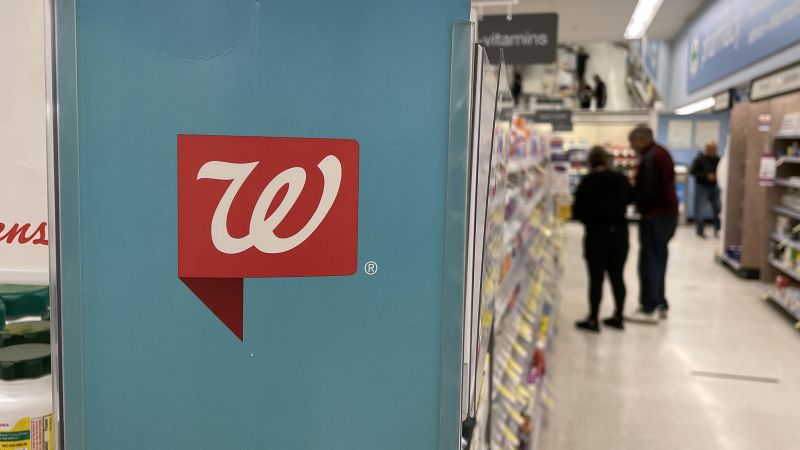Employees at two of the largest drugstore chains in the United States say harsh working conditions make it difficult to safely fill prescriptions, which could put the health of their customers at risk. Now, they’re demanding change by staging a series of walkouts across the country.
Pharmacy employees at some Walgreens stores, including pharmacists, technicians and support staff, are planning a walkout between October 9-11, an organizer, who asked to remain anonymous for fear of retribution from the chain, confirmed to CNN. Some employees plan to walk out for just one day, while others expect to shutter their pharmacies for all three days.
Employees at more than 500 of America’s approximately 9,000 Walgreens stores across the United States have expressed interest and solidarity, a Walgreens pharmacy employee and walkout organizer said, though fewer will likely end up participating.
CNN spoke to employees at three Walgreens stores in three states who said they plan on walking out.
The planned action comes after pharmacy employees walked off the job at multiple CVS stores in the Kansas City area last week.
The coordinated action at some Walgreens stores is in response to what pharmacy employees call burdensome prescription and vaccination expectations levied on pharmacists from corporate management, according to the organizer. As a result, employees often find themselves falling behind and dealing with angry customers.
The company sets performance expectations based on the number of team members each pharmacy should have, said the pharmacy worker. However, in reality, staffing is much lower than that. At the same time, the worker said, they’ve cut training hours for new technicians.
“We don’t believe that Walgreens is allowing us to give our patients safe care on a daily basis,” the organizer explained. “Walgreens isn’t responding, they’re not fixing those things.”
A representative from Walgreens said the company has increased training for new pharmacists but has put a pause on what it called “non-critical” training during the busy immunization season.
Walgreens representatives also told CNN that there have never been corporate quotas and that all task-based metrics for retail pharmacy staff as part of team members’ performance reviews were eliminated last year. The company said it has made $265 million in incremental investments in its nationwide pharmacy team this fiscal year and has created dedicated positions to manage inventory and administrative tasks for pharmacists.
Still, one pharmacy employee who said staff at their store will participate in the walkout on Monday told CNN that they are expected and incentivized to administer more vaccines. “I spend almost all of my day in the shot room, and if I’m not in the shot room I’m filling prescriptions because we’re so behind,” they said.
“There have been nights where I’ve been on the verge of tears because of how hard it is,” they said. “I had a patient give me a fist bump and tell me I was doing a good job, and that meant so much to me. The patients are caring more about us than the employer is.”
Another pharmacist told CNN that he expects his pharmacy to close during the planned walkout period and that he’s heard from Walgreens pharmacists at 13 other stores in his state who are interested in participating.
“We’re going to do way more harm to people in 10 more years of operating like this than we would with a three-day walkout,” the pharmacist said. “It’s time to try something different. Every year we get the same promises and every year we get the same Band-Aid on the problem.”
In a statement to CNN, Walgreens acknowledged that pharmacy employees were overworked.
“The last few years have required an unprecedented effort from our team members, and we share their pride in this work — while recognizing it has been a very challenging time,” said Fraser Engerman, a communications director at Walgreens. “We also understand the immense pressures felt across the US in retail pharmacy right now. We are engaged and listening to the concerns raised by some of our team members.”
Walgreens is “committed to ensuring that our entire pharmacy team has the support and resources necessary to continue to provide the best care to our patients while taking care of their own well-being,” added Engerman. “We are making significant investments in pharmacist wages and hiring bonuses to attract/retain talent in harder to staff locations.”
Pharmacy employees of Walgreens and CVS and pharmacist advocates told CNN that their work has always been difficult, but the pandemic made things near impossible. Employees describe severe and chronic understaffing, low pay, high vaccination quotas, long stretches without bathroom breaks, abusive management and violent customers.
Inspired by successful labor strikes across the country this year, they’re saying enough is enough and organizing walkouts as part of what some labor advocates are calling “pharmageddon.”
In September, CVS pharmacists shuttered as many as 22 pharmacies in two walkouts over two weeks in the Kansas City area in a planned protest, prompting executives from the Rhode Island-based retailer to meet with staff and assure that additional support and higher overtime pay were coming.
“Pharmacists are doing exactly what they’ve been trained to do, which is evaluate the situation and take whatever action is necessary to ensure that they’re providing the best patient care,” said Michael Hogue, CEO of the American Pharmacists Association, who traveled to Kansas City to meet with CVS executives and walkout organizers this week. “We have a widespread problem in the US of inadequate staffing in community-based pharmacies.”
Prem Shah, CVS’ chief pharmacy officer and president of pharmacy and consumer wellness, issued an internal memo, reviewed by CNN, apologizing to his pharmacy teams for failing to address the concerns in the region more quickly.
Employees remain skeptical.
Another meeting with Shah is planned for October 15, one of the CVS walkout organizers told CNN, but no time or location has been set.
“We’re committed to providing access to consistent, safe, high-quality health care to the patients and communities we serve and are working with our pharmacists to directly address any concerns they may have,” Amy Thibault, lead director of external communications for CVS Pharmacy, said in a statement to CNN. “We’re focused on developing a sustainable, scalable action plan that can be put in place in markets where support may be needed so we can continue delivering the high-quality care our patients depend on.”
Even a day without access to medication would be disastrous for Americans, said Amanda Applegate with the Kansas Pharmacists Association. “But making sure that you’re getting those prescriptions out in a timely, efficient and safe manner is [why] pharmacists are walking out,” she said. Pharmacists aren’t demanding huge pay increases and vacation days, she added, they’re asking for more help to get their jobs done.
This week, more than 75,000 Kaiser Permanente workers walked off the job, citing similar problems and marking the largest health care worker strike in US history.
Pharmacist advocates believe that the walkouts will likely continue for some time. CVS and Walgreens pharmacists are not currently represented by a union and these efforts have been coordinated by individual workers. However, multiple sources told CNN that employees at CVS and Walgreens have recently been in touch with union groups.
While Kansas City “has been a tinderbox,” said Applegate, these walkouts could have happened anywhere.
“It’s a hard job on a good day. It’s an incredibly rewarding job, but it’s hard,” she said. “And so the idea of pharmacists essentially being turned into ATMs in these environments, encouraging volume over quality, is why this is happening.”
Read the full article here




